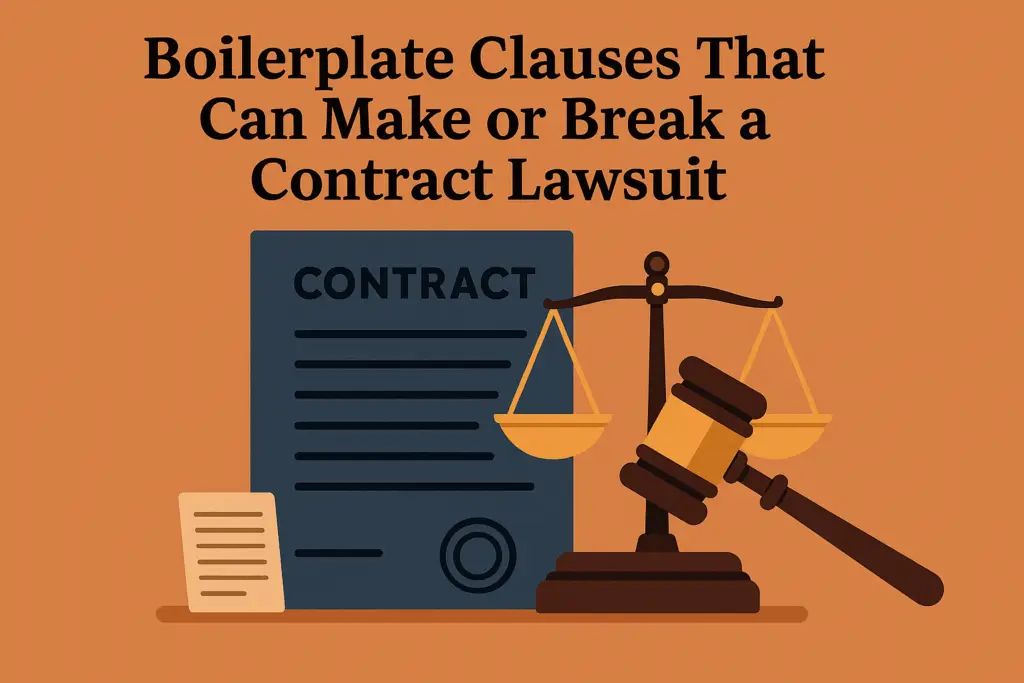Business owners often focus on the “big picture” terms in a contract — price, deliverables, timelines — while skimming over the so-called boilerplate language at the end. But when a deal goes sideways and ends up in court, it’s often that fine print that determines the outcome.
In Florida contract litigation, clauses buried in the last few pages of a contract can shape everything from where a lawsuit is filed to who pays attorneys’ fees — and whether a party can even sue at all.
Here’s a look at the key boilerplate clauses that can make or break your case.
1. Venue and Jurisdiction Clauses
Also known as a forum selection clause, this provision decides where disputes will be resolved — geographically and sometimes legally.
Example: “Any disputes shall be litigated in Broward County, Florida.”
Why it matters:
- Prevents being hauled into court across the state or country
- Gives you a home-court advantage
- Avoids out-of-state laws or procedures that are unfamiliar
✅ Tip for business owners: Always insist on your local jurisdiction — and make sure the clause is clear and enforceable under Florida law.
2. Choice of Law Clauses
This clause defines which state’s laws will govern the contract — and it’s especially important in multi-state or international deals.
Example: “This Agreement shall be governed by the laws of the State of Florida.”
Why it matters:
- Different states interpret contract breaches differently
- Florida law may be more favorable to businesses in terms of damages or enforceability
- Avoids costly battles over whose law applies
3. Attorney’s Fees Clause
Under Florida law, attorney’s fees are not automatically awarded in contract lawsuits. You only get them if your contract says so.
Example: “In the event of litigation, the prevailing party shall be entitled to recover reasonable attorneys’ fees and costs.”
Why it matters:
- Makes it easier to pursue enforcement (you’re not eating the cost to collect)
- Can deter frivolous lawsuits from the other side
- Often tips the scale in settlement negotiations
✅ Pro tip: Make sure the clause covers both trial and appeal — and defines what “prevailing party” means.
4. Integration (Entire Agreement) Clause
This clause states that the written contract is the final and complete agreement, superseding all prior discussions or side deals.
Example: “This Agreement constitutes the entire agreement between the parties and supersedes all prior negotiations.”
Why it matters:
- Prevents the other party from claiming you agreed to something not in writing
- Limits the scope of litigation to what’s actually in the contract
- Can block introduction of outside evidence in court (see: parol evidence rule)
5. No Waiver Clause
A no-waiver clause prevents either party from losing rights by failing to enforce them right away.
Example: “Failure to enforce any term shall not constitute a waiver of that term or any other.”
Why it matters:
- Protects your rights even if you overlook a breach initially
- Keeps you from accidentally losing leverage in future enforcement
- Courts take this language seriously if properly drafted
6. Force Majeure Clause
This provision excuses performance when unforeseen events occur — like hurricanes, pandemics, or government shutdowns.
Example: “Neither party shall be liable for failure to perform due to causes beyond their control, including acts of God, war, or labor strikes.”
Why it matters:
- May excuse a delay or default caused by events outside your control
- Can become the centerpiece of litigation after natural disasters or supply chain shocks
- Without it, you’re still expected to perform — or face breach claims
7. Notice Clause
This clause governs how and where legal notices must be sent — and when they are considered received.
Example: “All notices shall be sent via certified mail to the addresses listed below.”
Why it matters:
- Can affect trigger dates for termination, breach, or cure periods
- A party may claim they didn’t get proper notice — and courts may agree
- Email-only notice clauses need to be very specific to be enforceable
✅ Tip: Always follow the notice procedure exactly, and document proof of delivery.
8. Dispute Resolution Clause
Specifies how disputes will be resolved — in court, through mediation, or by arbitration.
Example: “Any disputes shall be resolved by binding arbitration in accordance with AAA rules.”
Why it matters:
- Can keep you out of court — or force you into private arbitration
- Affects costs, speed, and available remedies
- May limit your ability to appeal or conduct discovery
⚠️ Arbitration sounds faster, but it can be expensive and harder to challenge — make sure it’s right for your business.
Why These Clauses Matter More Than You Think
Courts often treat boilerplate clauses as fully enforceable, especially between sophisticated parties or businesses. If you didn’t negotiate them — or didn’t read them — that won’t help much in court.
When disputes arise, these clauses control:
- Where and how you can file
- Whether you can recover your attorneys’ fees
- What evidence the court will even consider
How Douglas Firm Helps Florida Businesses
At Douglas Firm, we help business owners:
- Draft contracts with strong boilerplate protections
- Review and negotiate commercial agreements
- Enforce or defend against breach claims in court
- Litigate disputes impacted by fine print clauses
We know what’s enforceable — and how to use it to your advantage if litigation happens.
Contact Douglas Firm Today
Don’t wait until the boilerplate becomes a battleground. Let us help you draft or review your contracts with the end in mind — and litigate smart if it comes to that.
📞 954.474.4420
📧 andrew@douglasfirm.com
🌐 www.douglasfirm.com
